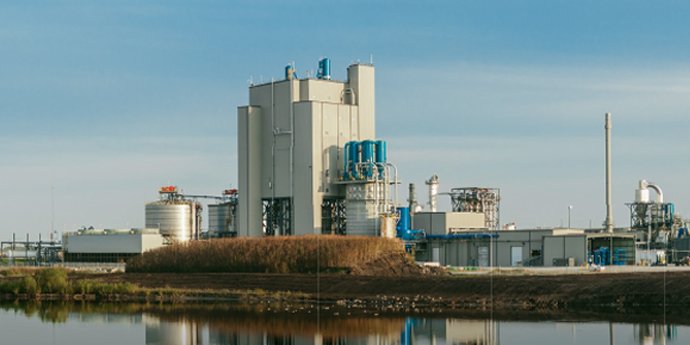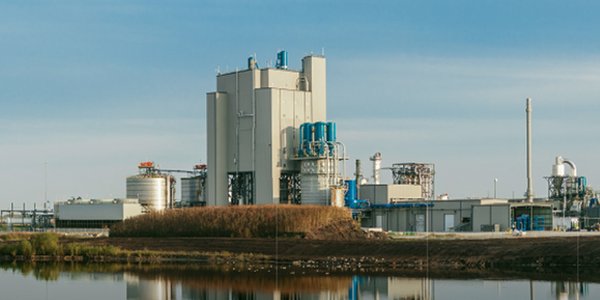Happy November blog readers! I am 10,000 feet in the air enjoying the gogowifi at Delta on my way to San Francisco to cover this week’s SynBioBeta conference. Follow my tweets at @DGreenblogger #SBBSF15.
Meanwhile, the biofuel industry (and renewable chemicals as well) was abuzz with the recent opening of DuPont’s much anticipated Nevada, Iowa, cellulosic ethanol facility, which the company claimed to be the largest in the world capable of producing 30 million gal/year of ethanol using corn stover for feedstock. Close to 500 local farmers from within a 30-mile radius of the facility will reportedly provide the annual 375,000 dry tons of stover needed.

The facility is expected to create around 80-90 permanent jobs and employ 150 seasonal employees for the annual stover collection, in addition to the over 1,000 construction jobs which were created during the build out of the facility.
A significant portion of the initial cellulosic ethanol production will be sold to the fuel industry especially in California to fulfill the state’s Low Carbon Fuel Standard where the state has adopted a policy to reduce carbon intensity in transportation fuels. DuPont has partnered with Murex LLC for the marketing of its ethanol, and the companies are reportedly in discussions with several companies to provide ethanol across North America. DuPoint is also evaluating several non-food fuel markets such as its previously announced collaboration with P&G.
The facility will also serve as a commercial-scale demonstration of the cellulosic technology where investors from all over the world can see how to replicate this model in their home regions.
DuPont has also been busy outside the US as it recently announced its first licensing agreement with New Tianlong Industry to build China’s largest cellulosic ethanol plant. In Europe, it has announced a memorandum of understanding with Ethanol Europe and the government of Macedonia to develop a biorefinery project.
Here are some fun facts that DuPont shared:
- The rate at which the plant will consume stover in continuous operations: 1 bale/minute
- 1 bale of stover = 40 gallons of ethanol
- DuPont began studying cellulosic ethanol in partnership with the Department of Energy in 2000
- 700,000 corn stover bales/year will come from the 30-mile feedstock supply radius
- 150 individuals are involved in the collection, transportation and storage of seasonal feedstock collected from 500 local farmers.
- DuPont also has a 250,000 gal/year demonstration facility in Vonore, Tennessee
In another recent DuPont story and related to my coverage of SynBioBeta conference, DuPont announced last month that it has formed a strategic alliance with California-based Caribou Biosciences to advance the two companies’ respective CRISPR-derived genome editing technology platforms. The agreement includes the cross-licensing of key intellectual property, a research collaboration, and financial investments by DuPont in Caribou, a developer of CRISPR-Cas technologies.
Caribou Biosciences will actually be presenting at SynBioBeta. For us chemical folks who are not that familiar with genomics, CRISPR reportedly stands for Clustered Regularly Interspaced Short Palindromic Repeats, which, according to this article from Forbes, is a genome-editing process that allows bacteria to acquire DNA from their surroundings and store it in a form of genomic memory. That process is accompanied by Cas (it stands for “CRISPR-associated”) proteins, which can change DNA in a variety of ways. Basically, CRISPR does the searching and Cas cuts and pastes. And Caribou and DuPont each have different ways of doing the science.
Now, why is this important? Potential applications include treating genetic diseases, fighting infections and increasing food crop yields. Companies in the industrial biotechnology sector can use this to manipulate microorganisms to produce the desired chemical building blocks that are difficult to obtain before.
In the agreement, Caribou will be able to license DuPont’s CRISPR technology for human and animal therapeutics, more industrial biotech and some other fields on both exclusive and non-exclusive bases; while DuPont gets exclusive access to technology for working with certain agricultural crops and non-exclusive access to some of Caribou’s other ideas related to agriculture and industrial biotech.
Here are some of the speakers at SynBioBeta talking about CRISPR-cas including Caribou Biosciences. I am excited to know more about this field and hopefully learn something new that I can share with the blog. So far, Carbio reportedly has raised $14.5 million in venture capital.




